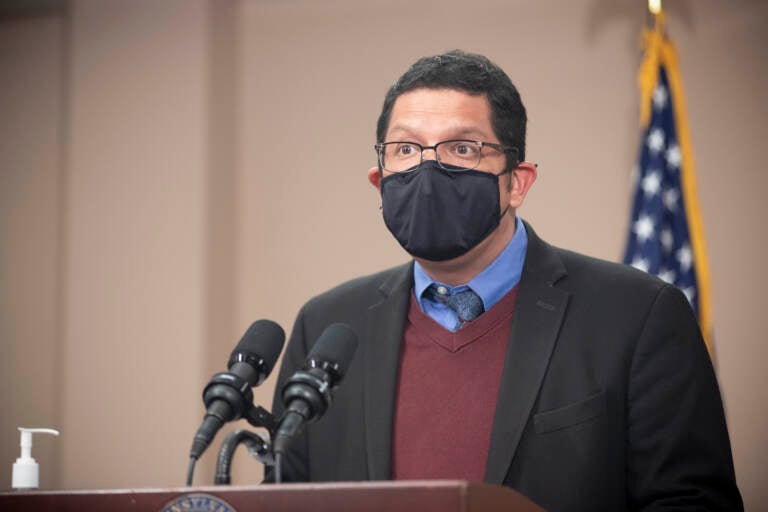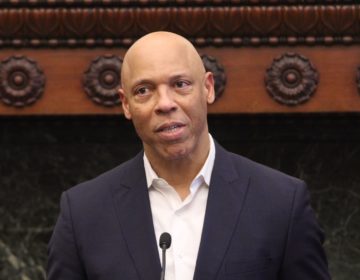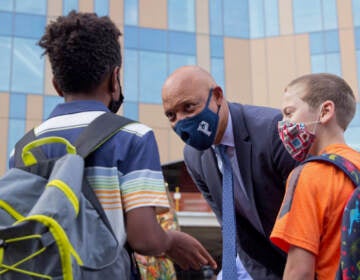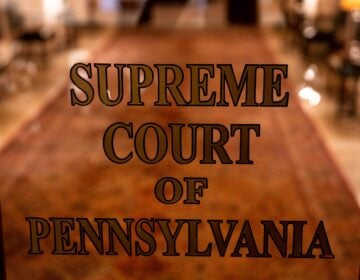A star witness — but a careful one — takes center stage in Pa. school funding trial
Secretary of Education Noe Ortega is a defendant in the trial. But he struck a neutral tone as a witness, mirroring the Wolf administration’s overall tact.

Pennsylvania Secretary of Education Noe Ortega speaks at a press conference in this file photo. (Office of Gov. Tom Wolf)
Pennsylvania Secretary of Education Noe Ortega testified Tuesday in the state’s landmark school funding trial, striking a neutral tone as lawyers grilled him about higher-education outcomes.
Under questioning from the petitioners, Ortega admitted that there are stark racial and socioeconomic disparities when it comes to which Pennsylvania students go onto higher-education.
Asked whether those gaps could be closed without further investment in K-12 schools, Ortega replied:
“It would be difficult.”
But Ortega also agreed when defense attorneys representing the Republican-controlled legislature poked holes in the petitioners’ arguments. He conceded, for instance, that higher-ed disparities might not be totally explained by funding shortfalls in the K-12 public system. One reason cited was the rising cost of college.
So went most of the testimony Tuesday, which largely involved Ortega making quick, affirmative statements to questions by attorneys on both sides.
The petitioners — a group of families, school districts, and advocates — are suing Pennsylvania over the way it funds schools, alleging that the state hasn’t met its constitutional obligation to provide a “thorough and efficient” system of public education.
As a representative of the Wolf administration, Ortega is technically a defendant in this case. But he and other respondents from the executive branch are in a politically precarious position. Wolf has forcefully argued for more education dollars and a redistribution of dollars that would send more money to low-income districts.
Initially, Wolf’s legal team argued that the case should not go to trial, before changing its position in 2016.
With the trial now in the state’s Commonwealth Court, Wolf’s legal team has largely taken a backseat so far. Since the trial started in November, defense lawyers for the state Senate and House have done the overwhelming majority of the defense questioning.
That held true today. Ortega’s lawyers were barely involved in the proceedings. Meanwhile, Ortega gave relatively brief and straightforward responses.
‘Is the department satisfied …?’
Most of his testimony revolved around higher-education outcomes in Pennsylvania. Before ascending to his cabinet role last year, Ortega was the Deputy Secretary and Commissioner for the Office of Postsecondary and Higher Education.
Ortega was asked about the state’s postsecondary attainment goal, which says that 60% of all working-age Pennsylvanians (age 25 to 64) should have some sort of higher-education credential by 2025. Ortega says that goal stems from labor-force demand.
“We’re maybe ten percentage points shy of being able to meet the goal we’ve set for 2025,” said Ortega.
At the current pace of higher-education enrollment, Ortega said, Pennsylvania will not get to 60% by 2025.
But he also conceded that part of the problem was Pennsylvania’s shrinking number of high school students — not simply the achievement and preparation level of those leaving high school. And he said meeting the goal would require convincing current adults to re-enroll in school.
Attorneys for the petitioners focused on data about post-secondary achievement in Pennsylvania that’s been gathered by the National Student Clearinghouse (NSC), a major educational nonprofit.
For instance, they pointed to NSC data for the high school class of 2011 that showed roughly 20% of economically disadvantaged students, 20% of Black students and 20% of Latino students earned a post-secondary degree within six years of graduation.
“How would the department characterize the size of the disparities between Black students, Latino students, economically disadvantaged students versus other student subgroups,” plaintiffs attorney Dan Urevick-Ackelsberg asked Ortega.
“We’d generally characterize it as … they complete at half the rate of their white counterparts in post-secondary degree credentials,” said Oretga.
“Is the department satisfied with those disparities,” Urevick-Ackelsberg asked.
“Absolutely not,” Ortega replied.
During cross-examination from defense attorneys, Ortega agreed that the NSC data may undercount some historically disadvantaged students because it does not include data from all for-profit institutions or certificate-granting institutions.
The defense also sought to cast doubt on the reliability of data reported to — and collected by — a third party contractor used by the state.
That was the one area, where attorneys for the executive branch — silent for most of the day — spoke up, arguing that the data should be admissible.
Ortega himself agreed.
“It’s really, practically speaking, no different than if we hired someone to collect the data,” he said.

Saturdays just got more interesting.
WHYY is your source for fact-based, in-depth journalism and information. As a nonprofit organization, we rely on financial support from readers like you. Please give today.








